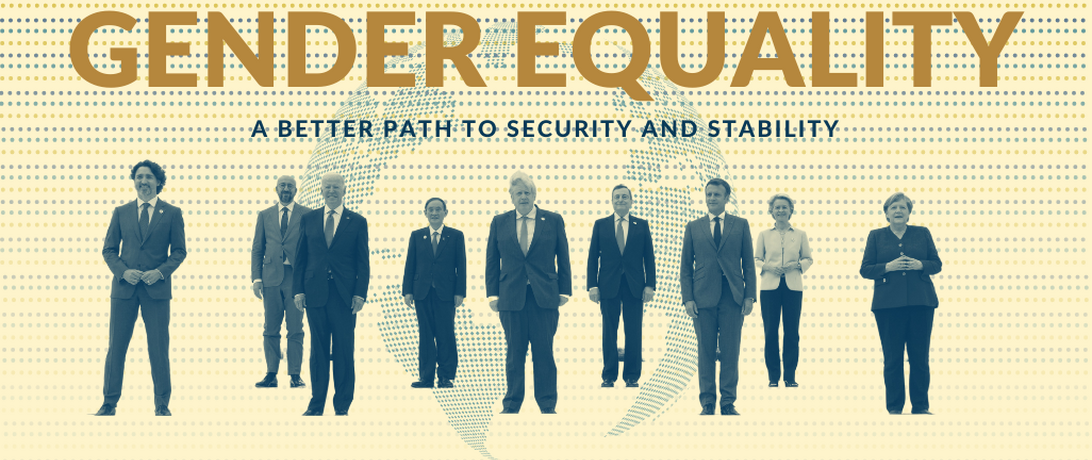
What happens when we depart from the traditional security path? Better outcomes for everyone.
In the middle of World War I, over 1,000 women activists across Europe organized a convention at the Hague to detail the link between women’s rights and international peace. In 1948, women played essential parts in drafting and completing the Universal Declaration of Human Rights, ensuring the inclusion of women’s rights. In 1979, feminists around the world succeeded in the UN’s adoption of the Convention on the Elimination of All Forms of Discrimation against Women (CEDAW).
We have over a century of activism and decades of formal evidence that prove that feminist, and particularly Women, Peace and Security (WPS), approaches are the most effective ways of tackling national and international insecurity.
Yet, not a single country has fully implemented this approach.
Advocates of WPS have largely relied on two central arguments to get governments to enact relevant policies: the human rights argument or the operational effectiveness argument. Both are sound arguments. But, neither has delivered the long-term, transformational change that WPS advocates have envisioned. So, it’s time for a new tactic.
Recently, One Earth Future conducted a survey with the Alliance for Peacebuilding asking peacebuilders and researchers about what kind of evidence exists and what is needed to improve the peacebuilding field. In the resulting report, Some Credible Evidence: Perceptions about the Evidence Base in the Peacebuilding Field, only three interventions met the cutoff for having “some credible evidence” showing impact: improving education, increasing women’s engagement in economic and political life as preventive measures, and increasing women’s participation in peace negotiations as peacemaking measures.
And yet, despite the recognition from this report and the large body of research that has already been produced, WPS advocates are asked by policymakers, funders, and government officials again and again to “prove” gender equality is effective. So it’s time to stop playing nice and asking them to do not only the right thing, but the smart thing.
It’s time that we call the failure to implement WPS what it is -- a threat to global security. Whether those with power are actively working against gender equality or simply not working towards it, that is a threat to national security and global stability.
Because people tend to have a difficult time seeing gender equality as the crucial policy that it is, let’s use an analogy.
We all want to feel safe in our homes, so let’s imagine we are presented with two security options. Plan A is a high-tech security system with alarms, armor and an elaborate defense protocol that anticipates potential threats and stops them, but it takes longer and costs more. Plan B is a gun that allows you to quickly react to something, but you are constantly having to upgrade to make sure it can outshoot your opponents. Which would you pick?
In the national and foreign policy space, Plan A is WPS and gender equality. Plan B is, well, pretty much still guns -- it’s the status quo of military might and deterrence. Plan B is being reactive and playing whack-a-mole, whereas Plan A is being proactive and has been proven to be more effective.
So why aren’t we doing it and why are we letting those in power get away with not doing it? When it comes down to it, the reality is one word: patriarchy.
Governments around the world have repeatedly asked for proof that gender equality and WPS works. Over and over again feminists have proven it. Those same governments have never asked for proof of policies that they regularly enact, but that regularly fail, like sanctions. When the incorporation of gender perspectives is brought up in these spaces, it is repeatedly treated as a side project and rarely given adequate funding, despite the mountains of evidence that prove its effectiveness. The reliance on outdated and less effective understandings of international relations is blatantly irresponsible.
We are globally facing several large scale conflicts at the moment. Many of the reports coming out of these conflicts are directly related to Women, Peace and Security, yet the analysis, responses and solutions continue to sideline gender.
If we ever want to achieve meaningful and lasting peace, we must utilize WPS. It is high time that we stop asking nicely, and time that we start demanding. We must make it known that government actors and those with power are failing us as citizens of our own nations and the world. We demand that they do better.
Article Details
Published
Topic
Program
Content Type
Opinion & Insights